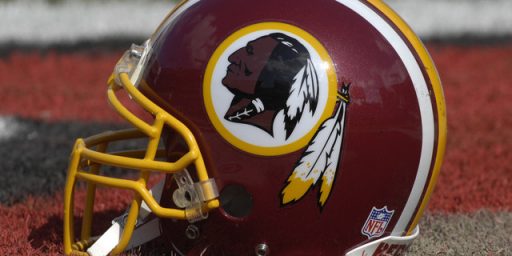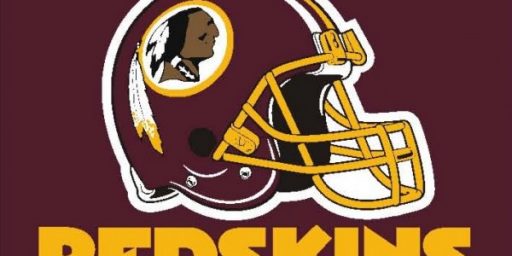“Redskin” as Slang and Slur
An interesting read via The Atlantic: When Slang Becomes a Slur.
UPDATE (James Joyner): An excerpt:
Whatever the connotations of “redskin” now, the question facing the Trademark Trial and Appeal Board was whether it was disparaging when the team first registered it as a trademark in 1967.
[…]
That may not have been so terribly long ago, but the racial attitudes of that era can strike us as primordial. What should we make of the fact that before the mark’s registration, no dictionaries labeled “redskin” as offensive, the way they did slurs for blacks and Jews? In fact it was only in 1967 that the Random House Dictionary became the first to provide such a label, and more than a decade went by before any others followed suit.
The team’s attorneys and linguistics experts argued that this demonstrated that the term had never really been disparaging—just a “robust informal synonym” for “American Indian,” which dictionaries only started to label as offensive in response to political pressure from a few Indian activists. But lexicographers are creatures of their age, and before the ’60s members of the dominant culture were selective in their sensitivities. Merriam-Webster’s monumental Third International, published in 1961, warned its readers off ”nigger,” “chink,” and “kike,” but it didn’t feel the need to indicate that some people might also take offense at “white trash,” ”gook,” “wetback,” “pansy” and “fag.” Not that those words hadn’t been derogatory or demeaning all along. It’s just that lexicographers and most everyone else weren’t capable of imagining how those words would land on the people they targeted.
“Redskin,” too, has been derogatory for a long time. It was recently discoveredthat the word actually began its life in English 200 years ago as a translation of an Indian term, via French—it didn’t have anything to do with those stories about bounties for bloody Indian scalps. But then “nigger” had a benign origin, as well. Since the mid-19th century “redskin” has simply been the slang word the white man used for the Indian, and like all slang words, it was infused with the attitudes about the thing it names. In the passages from books and newspapers and the movie clips we provided the court to document the word’s history, the word is inevitably associated with contempt, derision, condescension, or sentimental paeans to the noble savage. It couldn’t have been otherwise—what other attitudes were out there?





